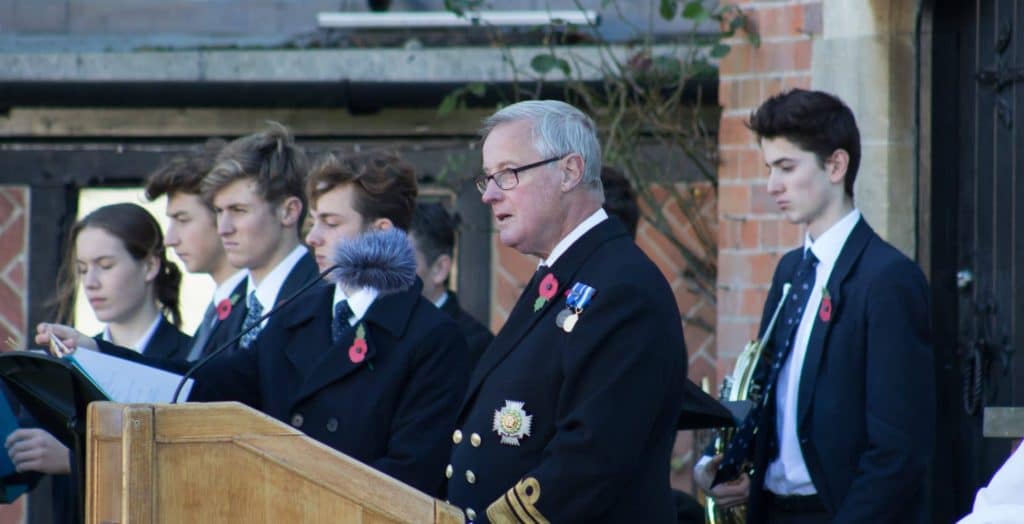This July day the blue skies were peaceful whereas in the war years there was a constant day-long buzz and throb of yellow Tiger Moth trainers, I think based at Theale Airfield. From these slow simple little biplanes the young pilot’s next step was a snarling Spitfire and combat. At the time of the Normandy landings US Dakotas towing troop carrying gliders briefly filled the skies. A Claremont Old Boy, Billy de Rees, was a glider pilot, a brave breed of men. The gliders were designed to break in two on landing so it was very much “a one way deal”, just the one chance to get it right with the lives of twenty or more soldiers in your hands.
Nights were anxious times. I recall what seemed like everlasting darkness, lying awake wondering whether the harsh engine sounds were friendly or German bombers. Every window which did not have curtains had a “made to fit” black screen which had by law to be in place at sunset, to be removed at daybreak; Bradfield had its own Warden Hodges who would knock on the door if he spotted a chink of light!
The most vivid nighttime memory is of those spent down in the cellars. Every child and member of staff had their own gas mask which was kept beside the bed. Whenever the chilling wail of the warning siren announced the impending arrival of German bombers we had to take a blanket from the bed, grab the gas mask and go down to the cellars. Of course there was no knowing for how long, it could be an hour or two waiting for the “all clear” siren to allow us back to bed so a supply of biscuits was kept together with whatever warm drink could be scrabbled together. There was a bonus however, the longer we had to be in the cellars the longer the extra time allowed in bed before the “get up bell” and the more lessons were scrapped. The demands of the military meant the teaching staff were women or older men; I recall the school matron, Matron Ford, commuted from a nearby village, the strangely named Tutts Clump.
In the last months of the War some V1 rockets, Doodlebugs, started to overfly Bradfield. These sinister weapons were “hit and miss flying bombs” without any control system, when they ran out of fuel they came down and did plenty of damage; they also raised people’s anxiety to a higher level. Their sound was akin to the throaty thumping of a Harley Davidson and it was reassuring to know that if you heard a doodlebug it would not come down on you, the impetus of their 350mph speed took them a few miles further.
Bradfield was a haven of peace. We felt the enveloping countryside protected us. Mrs Wilson, always wearing a brown smock, delivered the milk by horse-drawn float from her farm, wonderful creamy “straight from the cow” milk in churns placed at the top of the side door steps. Summer “refrigeration” was a hose directing cold water down the side of the churn. On the way from her farm she would have passed a sand martin colony on the left and on the right she would have heard skylarks singing while soaring from the meadow between The Close and the House on the Hill. Some days she would have encountered prisoners of war, apparently a mixture of Germans and Italians, being marched to work on farms and perhaps happy the fighting phase of their war was over.
The village shop, down the hill past the crossroads, was run by the three Minchin sisters; a trip to the shop was a highlight especially if there were unused coupons for sweets! My mother collected the sweets for all the children once a month and doled them out, an eagerly anticipated ritual. It was routine for parents to give their coupons to the children; rationing of sweets did not end until 1953, all rationing in 1954.
The footpath along the River Pang was a hive of activity; outdoor nature classes touched on catching trout, crayfish and newts. Some distance along the path towards Bucklebury there were watercress beds in serene crystal waters. My mother went there most weeks to buy some and the watercress was “cut and bundled while you wait”; it was a great way to supplement iron intake. Two bundles were more than enough for the whole school at a cost of 5d a bundle, a total of just over 2p in today’s money! Readers interested in inflation statistics might be amazed to know that £1 would have bought 60 Mars Bars. Meat and fish were scarce, cooks and caterers needed to be resourceful. Breakfast was routinely porridge throughout the year; we could tell which day of the week it was by the lunch dessert, semolina, sago, tapioca, macaroni, rice for weekdays with weekend treats of bread and butter pudding, junket or pink custard.





